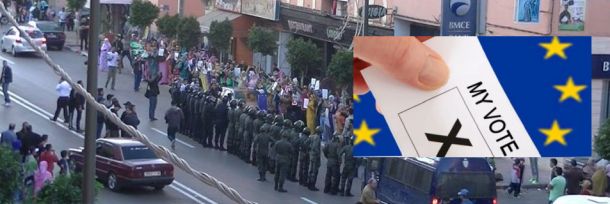2 Swedish students insist that the EU ambassador to Rabat had no reason to claim that "independent institutions" have supported the EU fisheries in Western Sahara, as he claimed in a press conference last year. Their correspondence with the EU delegation to Morocco reveals that the ambassador was only refering to the EU itself.
Letter below was sent by the Frej Winge and Jonna Wijk to the EU delegation to Rabat on 25 April 2011. The letter is a continuation of this correspondence. The students underline that the EU ambassador to Morocco had no reason to publicly claim in 2010 that at "independent institutions" have supported the legality of the EU fisheries in Western Sahara.
Dear Mr. Cassiers.
Thank you for your mail of 2 February, as reply to our mail of 31 January. It has regrettably taken some time to come back to you. We have spent a long time in the Sahrawi refugee camps in Algeria, collecting testimonies on whether the Sahrawi people wants the EU to fish in their waters or not.
We are surprised to hear from you that you are “not aware that the European Parliament has stated that the Fisheries agreement is incompatible with international law.“
You find the 2010 opinion of the European Parliament’s legal service here:
http://www.fishelsewhere.eu/index.php?cat=140&art=1077
The Parliament’s legal service quite clearly expresses that there is no proof that the Sahrawi people has been consulted, and therefore, that the agreement is in violation of international law. The legal service comes to this conclusion after analysing the available information about the implementation of the agreement, in the light of the conclusion of the UN legal opinion from 2002. The information provided by Morocco to the European Commission in December 2010 contains, furthermore, no proof of such consultation process.
As you maybe know, the 2006 opinions from the Commission and the Council, that you both refer to, failed to in any way take into account the conclusion of the UN document from 2002. The UN Legal Opinion of 2002 clearly states that the wishes of the Sahrawis must be taken into account in issues relating to such agreements.
The author of the UN legal opinion of 2002, former UN under-secretary general for legal affairs has on numerous occasions underlined that the European Commission has severely misused the UN document that he authored. The same conclusion of illegality of the EU fisheries agreement was given by the French lawyers NGO Sherpa (2006), by the Association of the Bar of the City of New York (2011), by a group of Swedish jurists from 4 universities (2011) and by the European Association of Lawyers for Democracy & World Human Rights, ELDH (2011)
http://www.wsrw.org/index.php?cat=193&art=1479
http://www.wsrw.org/index.php?parse_news=single&cat=105&art=1894
http://www.wsrw.org/files/dated/2011-02-17/swedish_legal-opinion_16.02.2011.pdf
http://www.eldh.eu/publications/publication/press-release-fishery-agreement-between-european-union-and-morocco-illegal-61/
The Ministry of Foreign Affairs of Sweden also concluded that it is in violation of international law, prior to the signing of the agreement. This is still the opinion of the Swedish government.
Taking into account that all these independent institutions have concluded the agreement is illegal, it is hard to interpret it otherwise as the statement from the EU ambassador is wrong.
The context of Landaburu’s public statement on 27th of May 2010 was "the European Commission and all advices from independent institutions have shown that there is no problem with the international legality of the fisheries agreement with Morocco".
Your clarification to us as of 2 February 2010, was that “Ambassador Landaburu referred to the European Commission, as well as to the Council and the European Parliament which are independent European institutions. At time of conclusion of the Fisheries agreement all considered it fully compatible with international law. “
If the meaning of “independent institutions” referred to other EU institutions, as you state in your mail to us, it is indeed a peculiar and misleading way to define “independent”. Although independent from the Commission, it is yet clearly an EU organ, defending the interests of the EU and its own electorate, just as is the case with the Council and the Parliament.
We would still, as we asked for in our previous letter, like you to send a clarifying note to the media and the audience of the 27 May 2010 event that no independent institutions are supporting the legality of the agreement. Since you mean that it is only EU institutions so far have supported the agreement, this should be stated clearly, adding that all other institutions, including the author of the UN opinion, declare the opposite. Your statement gives clearly an erroneous impression of external support of the legality of the agreement.
The best judge of the legality of the agreement, however, still remains the Sahrawi people. As you probably know, the conclusion of the UN Legal Opinion from 2002 states that their wishes must be taken into account.
If you possess any information that the wishes of the Sahrawi people have been taken into account, we would like you to please forward it to us.
Sincerely,
Frej Winge and Jonna Wijk.
Students from Jakobsberg Folkhögskola, Sweden.
Here is the EU Council's legal advice on fishing in occupied waters
Hans Corell criticizes EU fisheries in Western Sahara
The former Legal Counsel to the UN Security Counsel, Mr. Hans Corell, comments on the EU's fisheries activities in Western Sahara.
EU elections: how have candidates voted on occupied Western Sahara?
Are you casting your vote for the EU elections? Find here a complete overview of MEP candidates who have supported the Moroccan occupation of Western Sahara in previous controversial votes. Choose wisely.
UK High Court confirms EU Court rulings on Western Sahara
The UK Court has concluded that the UK government has acted unlawfully in granting preferential tariff treatment to products from Western Sahara through a deal with Morocco, and in granting fisheries quota's for fishing in Western Sahara under a fish deal with Morocco.

